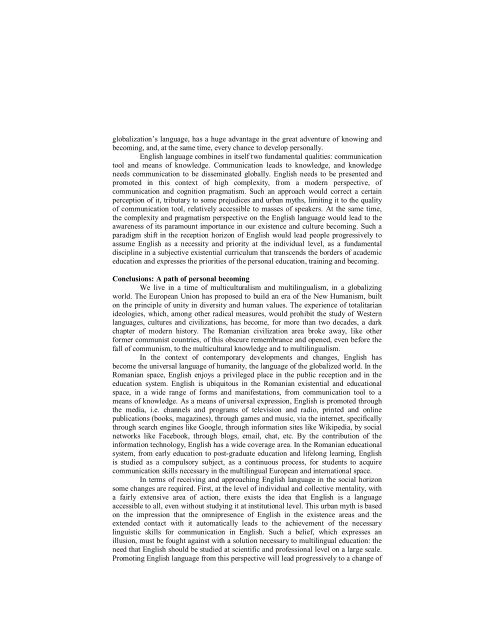language and literature european landmarks of identity
language and literature european landmarks of identity
language and literature european landmarks of identity
You also want an ePaper? Increase the reach of your titles
YUMPU automatically turns print PDFs into web optimized ePapers that Google loves.
globalization’s <strong>language</strong>, has a huge advantage in the great adventure <strong>of</strong> knowing <strong>and</strong><br />
becoming, <strong>and</strong>, at the same time, every chance to develop personally.<br />
English <strong>language</strong> combines in itself two fundamental qualities: communication<br />
tool <strong>and</strong> means <strong>of</strong> knowledge. Communication leads to knowledge, <strong>and</strong> knowledge<br />
needs communication to be disseminated globally. English needs to be presented <strong>and</strong><br />
promoted in this context <strong>of</strong> high complexity, from a modern perspective, <strong>of</strong><br />
communication <strong>and</strong> cognition pragmatism. Such an approach would correct a certain<br />
perception <strong>of</strong> it, tributary to some prejudices <strong>and</strong> urban myths, limiting it to the quality<br />
<strong>of</strong> communication tool, relatively accessible to masses <strong>of</strong> speakers. At the same time,<br />
the complexity <strong>and</strong> pragmatism perspective on the English <strong>language</strong> would lead to the<br />
awareness <strong>of</strong> its paramount importance in our existence <strong>and</strong> culture becoming. Such a<br />
paradigm shift in the reception horizon <strong>of</strong> English would lead people progressively to<br />
assume English as a necessity <strong>and</strong> priority at the individual level, as a fundamental<br />
discipline in a subjective existential curriculum that transcends the borders <strong>of</strong> academic<br />
education <strong>and</strong> expresses the priorities <strong>of</strong> the personal education, training <strong>and</strong> becoming.<br />
Conclusions: A path <strong>of</strong> personal becoming<br />
We live in a time <strong>of</strong> multiculturalism <strong>and</strong> multilingualism, in a globalizing<br />
world. The European Union has proposed to build an era <strong>of</strong> the New Humanism, built<br />
on the principle <strong>of</strong> unity in diversity <strong>and</strong> human values. The experience <strong>of</strong> totalitarian<br />
ideologies, which, among other radical measures, would prohibit the study <strong>of</strong> Western<br />
<strong>language</strong>s, cultures <strong>and</strong> civilizations, has become, for more than two decades, a dark<br />
chapter <strong>of</strong> modern history. The Romanian civilization area broke away, like other<br />
former communist countries, <strong>of</strong> this obscure remembrance <strong>and</strong> opened, even before the<br />
fall <strong>of</strong> communism, to the multicultural knowledge <strong>and</strong> to multilingualism.<br />
In the context <strong>of</strong> contemporary developments <strong>and</strong> changes, English has<br />
become the universal <strong>language</strong> <strong>of</strong> humanity, the <strong>language</strong> <strong>of</strong> the globalized world. In the<br />
Romanian space, English enjoys a privileged place in the public reception <strong>and</strong> in the<br />
education system. English is ubiquitous in the Romanian existential <strong>and</strong> educational<br />
space, in a wide range <strong>of</strong> forms <strong>and</strong> manifestations, from communication tool to a<br />
means <strong>of</strong> knowledge. As a means <strong>of</strong> universal expression, English is promoted through<br />
the media, i.e. channels <strong>and</strong> programs <strong>of</strong> television <strong>and</strong> radio, printed <strong>and</strong> online<br />
publications (books, magazines), through games <strong>and</strong> music, via the internet, specifically<br />
through search engines like Google, through information sites like Wikipedia, by social<br />
networks like Facebook, through blogs, email, chat, etc. By the contribution <strong>of</strong> the<br />
information technology, English has a wide coverage area. In the Romanian educational<br />
system, from early education to post-graduate education <strong>and</strong> lifelong learning, English<br />
is studied as a compulsory subject, as a continuous process, for students to acquire<br />
communication skills necessary in the multilingual European <strong>and</strong> international space.<br />
In terms <strong>of</strong> receiving <strong>and</strong> approaching English <strong>language</strong> in the social horizon<br />
some changes are required. First, at the level <strong>of</strong> individual <strong>and</strong> collective mentality, with<br />
a fairly extensive area <strong>of</strong> action, there exists the idea that English is a <strong>language</strong><br />
accessible to all, even without studying it at institutional level. This urban myth is based<br />
on the impression that the omnipresence <strong>of</strong> English in the existence areas <strong>and</strong> the<br />
extended contact with it automatically leads to the achievement <strong>of</strong> the necessary<br />
linguistic skills for communication in English. Such a belief, which expresses an<br />
illusion, must be fought against with a solution necessary to multilingual education: the<br />
need that English should be studied at scientific <strong>and</strong> pr<strong>of</strong>essional level on a large scale.<br />
Promoting English <strong>language</strong> from this perspective will lead progressively to a change <strong>of</strong>


